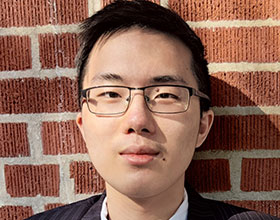Short Essay
Seventeen APs, many more Honors classes, leadership in five clubs, three research internships, one thousand service hours, and four part-time jobs. You’d think I’d get no hours of sleep. In reality, I’m in bed by 11 PM every day.
"But no matter how high I climb, I reinvest in my origins and uplift those around me."
- Angelina X.
How did I do this? I identify as a full-time student and daredevil warrior. With these roles in mind, I formed my priorities and ruthlessly trimmed out extraneous activities.
First and foremost comes academics. Beginning high school, I retained the mindset that “time is abundant.” However, I soon realized that turning in assignments five minutes before the due time –while praying that the Internet would not crash – was not conducive to my blood pressure nor mental health. Stress enables efficiency to a certain extent, but over that threshold, it leads to unsustainable breakdowns.
Thus, productivity became a matter of planning my schedule down to the hour – even the minute. I took full advantage of my downtime: studying on the school bus, between breaks at work, or waiting for my parents to pick me up from activities.
"Education is the most powerful weapon for changing the world, and there’s something so much more powerful, fulfilling, and worthwhile in helping others, than only serving myself."
- Angelina X.
Unsurprisingly, the “pings” on my phone and the temptation to tap on Instagram detracted from my focus. Whenever I turned on my mental “study-mode,” I also turned on my devices’ “Do Not Disturb” mode. On Google Chrome, I downloaded the “Blocksite” plug-in to blacklist social media sites while studying.
When I found myself unable to begin a daunting pile of work, I broke it into smaller, more manageable tasks and coaxed myself to begin. The mental barrier towards productivity is often a matter of minutes. After those first five minutes, I found myself enjoying the problem-sets. By completing schoolwork efficiently, I had more time to pursue my role as a daredevil warrior.
So how am I a daredevil warrior? No matter the obstacles, I fight for my dreams and passions. Thus, my extracurriculars were never a burden.
Since freshman year, I’ve volunteered at Children’s Hospital for over 500 hours. Here, I witnessed the beauty of the patient-doctor bond: one doctor rocked a child to sleep; another adopted her infant patient. However, even on weekends, children braved illness alone; parents were away, working to pay crushing medical bills, the #1 cause for bankruptcy in America.
In my sophomore year, I founded Miracle Network to raise money and awareness for pediatric illness. As Founder and President, I unified the movement by rallying other clubs and sports to form “fundraising teams.” For community awareness, we went door-to-door to businesses for sponsorships. Unfortunately, COVID-19 halted in-person fundraisers. Instead, I spearheaded 10 hours of virtual support sessions, reaching 1,000 patient families. To date, we’ve raised $10,000, and Miracle Network has been featured in Yahoo and MSN News.
I have to thank the pandemic for illuminating my real passions: social distancing compelled me to seek alternatives for activities I was truly invested in while eliminating less important activities. Similar to Miracle Network, my research internships were canceled. Instead, I attended the virtual New Jersey Governor’s School in the Sciences, where we conducted machine learning research and took college courses in neurobiology and cancer. I also participated in virtual science fairs and placed 2nd in Computer Science for my machine learning research on misinformation detection. As for activities like orchestra, I haven’t touched my violin since. I realized that I only participated due to FOMO (fear of missing out). Reflecting on my priorities better balanced my time and well-being.
Additionally, as a daredevil warrior, I’ve continually chosen passion over conformity. Despite being a female minority in STEM, I carved out my own path, placing in the Top 3% internationally for biology, Top 50 nationally in the USA Biology Olympiad, and two-time champion in the New Jersey Science League.
Two years ago, I witnessed dementia feed on my uncle’s memories. This launched me to apply my textbook knowledge to research. As a high schooler without research connections, I emailed over 70 professors to obtain my first internship. After all, I only needed one, and the effort paid off.
To date, I've first-authored 7 research publications in the National Institutes of Health, International Neuroethics Society, etc. My Alzheimer's research has also been recognized by the American Academy of Neurology and the Regeneron Science Talent Search, whose alumni network includes Nobel Laureates. However, these aren’t for personal recognition; they bring science to a larger platform and promote public awareness.
With my newfound science experience, I was elected President of the Biology Club, Research Club, New Jersey Science League, and Science National Honors Society. But no matter how high I climb, I reinvest in my origins and uplift those around me.
When my first science mentee won a research fair, I smiled until my cheeks hurt. When another received a $100 science award, I cried with happiness for 10 minutes straight. Education is the most powerful weapon for changing the world, and there’s something so much more powerful, fulfilling, and worthwhile in helping others, than only serving myself.
Most importantly, I leave time for friends and family. These relationships set the foundation for my well-being and happiness. They offer words of wisdom, relaxation, and inspiration for my goals.
As for the future, I aspire to study for an MD/PhD and become a physician-researcher. Balancing rigorous academics, residency, volunteering, and family will be more relevant than ever. Like Miracle Network and STEM, this career will be no burden. As a researcher, I want history to record the number of treatments I curate, the number of lives I save, and the medical costs I reduce. As a physician, I will become the pillars of support for my patients. Battling alongside them, I want to witness their power and hope rebound with the therapies I create. With this dual role, I will continue to advocate for the underserved.
The journey ahead may be daunting, but I’m a daredevil warrior: I dare to dream, and I fight for my dreams to become reality.
- Angelina X.

















